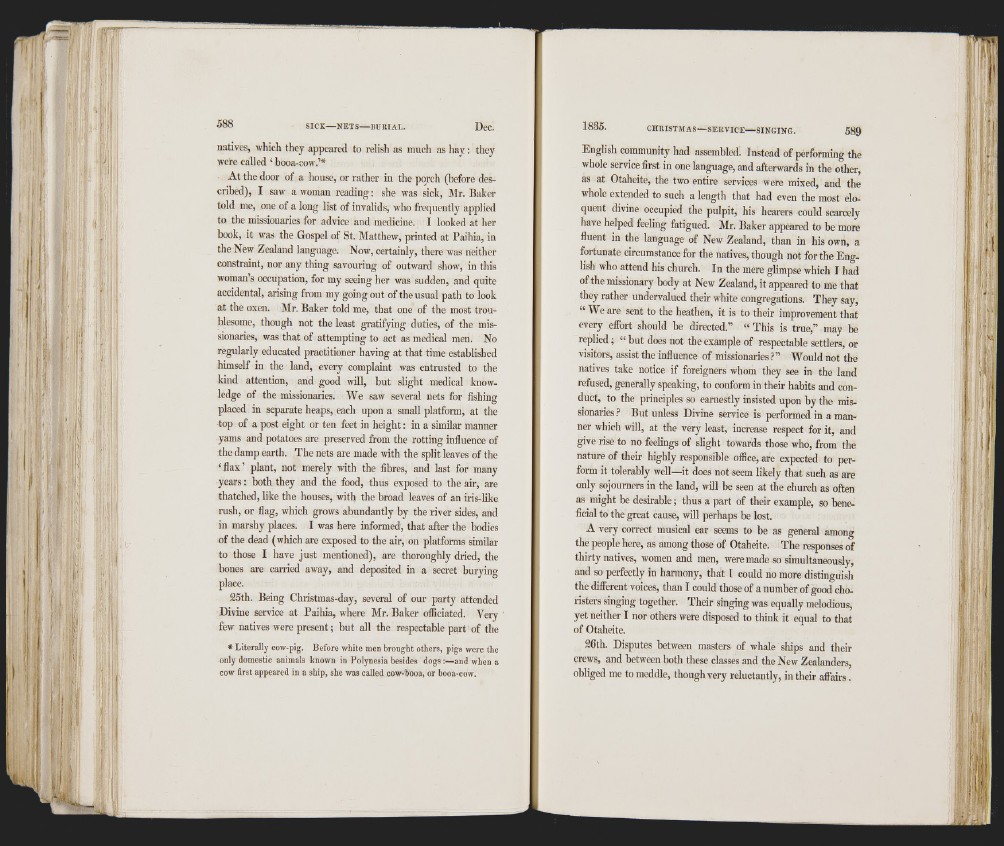
i? I;
Mi 'íH
natives, which they appeared to relish as much as hay; they
were called ‘ booa-cow.’*
At the door of a house, or rather in the porch (before described),
I saw a woman reading: she was sick, Mr. Baker
told me, one of a long list of invalids, who frequently applied
to the missionaries for advice and medicine. I looked at her
book, it was the Gospel of St. Matthew, printed at Paihia, in
the New Zealand language. Now, certainly, there was neither
constraint, nor any thing savouring of outward show, in this
woman’s occupation, for my seeing her was sudden, and quite
accidental, arising from my going out of the usual path to look
at the oxen. Mr. Baker told me, that one of the most troublesome,
though not the least gratifying duties, of the missionaries,
was that of attempting to act as medical men. No
regularly educated practitioner having at that time established
himself in the land, every complaint was entrusted to the
kind attention, and good will, but slight medical knowledge
of the missionaries. We saw several nets for fishing
placed in separate heaps, each upon a small platform, at the
top of a post eight or ten feet in height: in a similar manner
yams and potatoes are preserved from the rotting influence of
the damp earth. The nets are made with the split leaves of the
‘ flax’ plant, not merely with the fibres, and last for many
years: both they and the food, thus exposed to the air, are
thatched, like the houses, with the broad leaves of an iris-like
rush, or flag, which grows abundantly by the river sides, and
in marshy places. I was here informed, that after the bodies
of the dead (which are exposed to the air, on platforms similar
to those I have just mentioned), are thoroughly dried, the
bones are carried away, and deposited in a secret burying
place.
25th. Being Christmas-day, several of our party attended
Divine service at Paihia, where Mr. Baker officiated. Very
few natives were present; but all the respectable part of the
* Literally cow-pig. Before white men brought others, pigs were the
only domestic animals known in Polynesia besides dogs :—and when a
cow first appeared in a ship, she was called cow-booa, or booa-cow.
English community had assembled. Instead of performing the
whole service first in one language, and afterwards in the other,
as at Otaheite, the two entire services were mixed, and the
whole extended to such a length that had even the most eloquent
divine occupied the pulpit, his hearers could scarcely
have helped feeling fatigued. Mr. Baker appeared to be more
fluent in the language of New Zealand, than in his own, a
fortunate circumstance for the natives, though not for the English
who attend his church. In the mere glimpse which I had
of the missionary body at New Zealand, it appeared to me that
they rather undervalued their white congregations. They say,
“ We are sent to the heathen, it is to their improvement that
every efibrt should be directed.” “ This is true,” may be
replied; “ but does not the example of respectable settlers, or
visitors, assist the influence of missionaries.?” Would not the
natives take notice if foreigners whom they see in the land
refused, generally speaking, to conform in their habits and conduct,
to the principles so earnestly insisted upon by the missionaries
.? But unless Divine service is performed in a manner
which will, at the very least, increase respect for it, and
give rise to no feelings of slight towards those who, from the
nature of their highly responsible office, are expected to perform
it tolerably well—it does not seem likely that such as are
only sojourners in the land, will he seen at the church as often
as might be desirable; thus a part of their example, so beneficial
to the great cause, will perhaps be lost.
A very correct musical ear seems to be as general among
the people here, as among those of Otaheite. The responses of
thirty natives, women and men, were made so simultaneously,
and so perfectly in harmony, that 1 could no more distinguish
the different voices, than I could those of a number of good choristers
singing together. Their singing was equally melodious,
yet neither I nor others were disposed to think it equal to that
of Otaheite.
26th. Disputes between masters of whale ships and their
crews, and between both these classes and the New Zealanders,
obliged me to meddle, though very reluctantly, in their affairs.
«d |3 i
1
“'1
8‘i t
i n
I : ' V L*
. V •
>